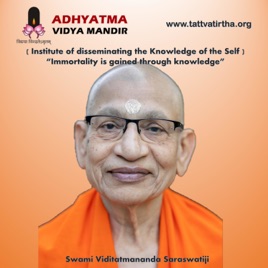
Advertise on podcast: Adhyatma Vidya Mandir
Rating
4.7 from
Country
This podcast has
1497 episodes
Language
Publisher
Explicit
No
Date created
2020/09/07
Average duration
32 min.
Release period
39 days
Description
Adhyatma Vidya Mandir is an Institute of disseminating the knowledge of the self, an Institute that perpetuates the vision of Śāṅkaraparamparā, unfolding the vision of Vedānta on how Ātmā alone is truth, the non-negatable, absolute reality, and everything other than Ātmā is Mithyā, a relative reality, dependent on Ātmā. The understanding of this vision alone leads one to the discovery of the nature of self as non-dual, the one without the second. Coming down from the lineage of this Śāṅkaraparamparā, from Lord Shiva himself to Ādi Guru Śaṅkarācāryajī, to Pujya Swami Viditatmananda Saraswatiji
Podcast episodes
Check latest episodes from Adhyatma Vidya Mandir podcast
Ishavasyopanishad chanting
2022/05/18
Ishavasyopanishad chanting bu Swami Viditatmananda Saraswatiji.
Mundakopanishad Chanting
2021/11/09
Mundakopanishad Chanting by Swamiji
Mandukya Upanishad Chanting
2021/11/09
Mandukya Upanishad Chanting by Swamiji Viditatmananda Saraswatiji
Kaivalya Upanishad Chanting
2021/11/08
Kaivalya Upanishad Chanting by Swamiji Viditatmananda Saraswatiji
Kathopanishad Chanting
2021/11/08
Kathopanishad Chanting by Swami Viditatmananda Saraswatiji
24 May 30th, 2021 Sunday Morning Youth Session: Interpreting Truth, and Objectivity and Subjectivity
2021/06/20
In this Sunday Morning Youth session, Pujya Swamiji addresses the doubts related to previous session on speaking truth, and in the latter half introduces the topic of objectivity and subjectivity.
With regards to speaking truth, one of the questions raised is how to master the skill of speaking truth without not hurting others. Pujya Swamiji responds how first we have to have the value to not hurt others and keep our intentions clean and make our best attempts. It is pointed out how our interpretations are dependent on our impressions based on our history with different people, and thus there is likelihood of misinterpretations in our interactions with the world. It is important to start fresh in all our interactions without basing the interaction with a judgement and certain conclusion about the other person. How it is important to seek pardon, respecting the feeling of others, even when our intention was not to hurt the other person but the other person feels hurt. Even if we may not feel the way the other person feels, respecting their feelings is part of non-violence. In our interaction we need to resolve how we didn’t intend to hurt others and be sensitive to the other person and communicate our intentions clearly and build on the relationships. Our endeavor should not be just to increase the number of friends and relations, but to improve the quality of every relationship. Pujya Swamiji also emphasizes how we need to be genuine in our endeavors when we seek pardon otherwise it would again lead to not speaking truth. And it is the caring for the other person which should be the driving factor when we seek such pardon for it to be genuine. Thus speaking truth requires use of appropriate words, and requires carefulness and alertness.
In the latter part the discussion on non-violence is summarized on how more consumption and more possession for pleasure results in violence. How we have concluded that pleasure comes from the objects of the world. Basically we seek happiness and see these objects of the world as means of pleasure. With this Pujya Swamiji transitions into a new topic of objectivity and subjectivity. Pujya Swamiji points out how we have wrongly concluded that this world is a means of pleasure without applying reasoning or logic. Even though we do have the faculty of reasoning and logic, right now we have a distorted reasoning. Although we are able to apply reasoning well for objective things without any opinions, and we are impartial towards it, but when it comes to subjective things, our opinion about ourself, we are not open-minded, we are partial, we are manipulative. So our scriptures help us to check and correct our reasoning and conclusions with regards to understanding ourself.
more
23 April 11th, 2021 Sunday Morning Youth Session: Truth and Non-violence
2021/06/20
In this Sunday Morning Youth session, Pujya Swamiji talks about truth and non-violence as important values to inculcate in our life. Pujya Swamiji points out that in life what is important is to travel in the right direction, and for that we need to make right choices. These values guide us to make the right choices and thus stay on track.
Pujya Swamiji provides here the basis for understanding and interpreting what truth and non-violence is in a given situation. The two aspects: Truth as in speaking truth and non-violence at the physical level are essentially unfolded and how to understand and interpret these aspects in our life is elaborately discussed. It is pointed out that speaking truth includes speaking pleasantly meaning being sensitive about the feelings of other people, respecting their feelings, refraining from doing something that will hurt their feelings, and speaking only if needed, meaning if it would be beneficial to the other person, or for the greater good. Speaking truth requires strength and not hurting others requires sensitivity on our part. Thus speaking truth makes us both a strong and sensitive person, and helps us understand and accommodate others in our life. Observing our own self and looking at the events in our life, whether or not we bend the truth in certain circumstances, would help us understand the subtleness of truth in our life.
In the latter part, Pujya Swamiji elaborates on non-violence at physical level, how consumption and possession are a mark of violence, because it deprives the others of their food. Thus consuming and possessing just what we need, not over-consuming for our pleasure or enjoyment, is a value whereby we can be sensitive to the needs of other fellow beings and creatures, and address scarcity of resources by a simple act of minimizing our consumption and possession.
Om!
more
22 April 4th, 2021 Sunday Morning Youth Session: Separation is a Notion
2021/04/11
In this Sunday Morning Youth session, Pujya Swamiji unfolds how our feeling of being separated from God is a notion. How the separation from God is like river feeling separated from the ocean. But if we investigate the essential nature of river, is it the banks, the flow or water? True nature is that which never changes. River when meets the ocean doesn’t remain as Ganga, Kaveri etc. The incidental changes but the essential doesn’t change. So also when you forget your identity you behave what you are not. Separation from God is a notion not a reality! Knowing this reality that separation was false, notion, you own up your true nature. So you are what you are from one standpoint, and from other standpoint, you have costume, which changes. This is the discrimination we have to understand in life. All values are meant so someday we can recognize our true nature. When we live the life the right way following the values, it becomes a journey in this direction, so that someday we discover this fact that there is no separation! To know one’ s essential nature is the real success, and for this we inculcate values in our life.
more
21 Satsang with Swamiji
2021/04/06
Questions on Mandukya Upanishad and from Gita Management Wisdom book: fulfilling one's own expectations, and contribution: contributing that which is valuable to me.
20 Satsang on Death and Moksha (Gujarati)
2021/04/05
This Satsanga is in Gujarati. Pujya Swamiji in thus Satsanga clarifies what is death and moksha. More we understand the phenomenon of what death is and who dies, lesser the fear and better the ability to see the situation in its reality. In this Satsanga Pujya Swamiji clarifies many of these concepts and in the process unfolds yet another way of approaching life, understanding life.
more
19 March 28th, 2021 Sunday Morning Youth Session: Importance of Prayers
2021/04/04
In this Sunday Morning Youth session, Pujya Swamiji answers to some fundamental questions each of us have within. When did we get separated from God? Pujya Swamiji points out to pay attention of why this question arises. Because we feel separated from God, we feel we don’t see God, we don’t know where he is. This sense of separation is explained differently in different philosophies, but what is important is that we feel separated, why we feel so is not so important. The various Acharyas have given us the means to remove that separation, like Bhakti. Pujya Swamiji explains how there should be worship of Isvara in one way or other.
We need Isvara’s anugraha to accomplish moral, wordly and spiritual goals. Because for any successful accomplishment both self effort, a proper and adequate one at the right time, and grace of God is required. We are born with the need to be successful, the outcome is very important to us, and thus grace of God is very important in our life. So Isvara’s anugraha is important for helping us to be successful, as we are selfish people. But someday we will grow out of this begging, and the prayers will be an offering, just out of pleasure.
Knowingly or unknowingly Isvara is the most important in our life, and we are born with this destination in mind, and our journey finds its culmination when we meet Bhagawan. What is growth? When we become free from our needs progressively! Right now we have many needs and our happiness depends on fulfilling those needs. By including prayers in our life, we live a conscious life, so we don’t take things for granted. We always need the grace of God, which we are as such receiving without asking. So let us all include prayers in our life whether it be to fulfill our needs, whether it be as an offering, let us all contemplate on the constant grace we are experiencing and offer our gratitude towards our Bhagawan.
more
18 March 21st, 2021 Sunday Morning Youth Session: Speaking Truth
2021/03/24
In this Sunday Morning Youth session, Pujya Swamiji speaks about truthfulness as a value in our life. The scriptures claim, ‘Truth alone prevails, wins’. This is what we have to discover in our life. The simple meaning of truth is taken here as speaking truth. But what does speaking truth involve is unfolded elaborately. Speaking truth: does it mean I have to speak all the time? No, but if you choose to speak, speak truth. Secondly speak in a pleasant way which doesn’t hurt others. Truth should not become violent. Sometimes we do speak truth but are not sensitive to the feelings of others. Truth is not bitter but sometimes bitterness in in our own mind, and it expresses in guise of truth. Third, truth is supposed to serve a purpose, overall good.
When we communicate with others we need to make sure our words do not hurt others, the feelings of others, are truthful, and for the overall benefit of others. Now this requires Viveka. I must think before I speak. Speech is a great gift, but if not used properly can bring damage, lot of hurt, destruction. So through our interactions we need to constantly be on guard for proper interpretation of speaking truth, and be watchful of what and how we speak, and in what circumstances we speak.
The youth and the seekers are encouraged to refer to the ‘Management Wisdom from Bhagavad Gītā’ by Pujya Swami Viditatmanandaji. This reading will provide further clarity of understanding and interpreting the issues we face in our daily life, and will complement this Satsanga.
more
Podcast reviews
Read Adhyatma Vidya Mandir podcast reviews
Harih Om!
2020/09/13
Vedanta clarity
This is the great podcast to understand the traditional Shankara Vedanta. Very authentic and crystal clear teaching. It is very rare to get along with...
more
Podcast sponsorship advertising
Start advertising on Adhyatma Vidya Mandir & sponsor relevant audience podcasts
You may also like these religion Podcasts

4.6
1587
778
Sounds True: Insights at the Edge
Tami Simon

4.7
1320
305
The Astrology Podcast
Chris Brennan

4.8
334
157
The Catholic Gentleman
John Heinen, Sam Guzman

4.9
29
176
Come Follow Up
BYUradio

4.9
22410
843
Unashamed with the Robertson Family
Blaze Podcast Network

5
2
5
Hiking with a Purpose
Catholic Women Who Hike

4.7
120
206
Teaching With Power
Benjamin Wilcox

4.8
807
487
Rabbi Daniel Lapin
Blaze Podcast Network

4.8
544
240
Deconversion Therapy
deconversiontherapy

4.5
768
204
The Deconstructionists
John Williamson



